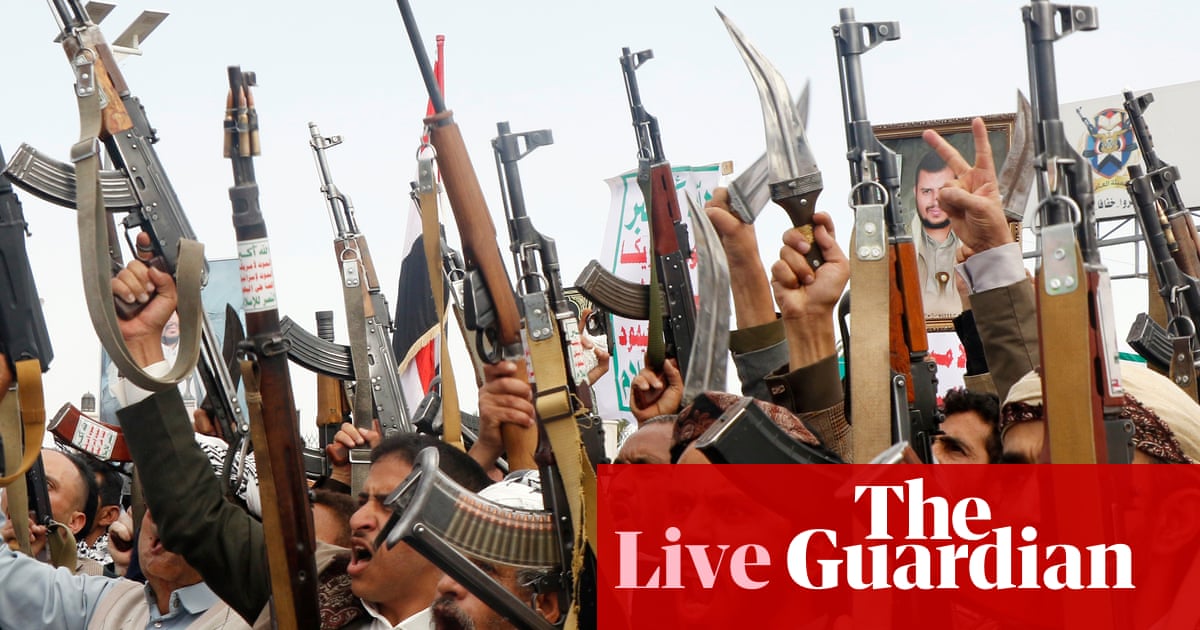The Israeli military issued warnings on Wednesday to evacuate three seaports in Yemen including Ras Issa, Hodeidah and Salif, Reuters reports.
The army claimed the ports were being used by the Iran-aligned Houthi group.
The Israeli military said on Wednesday that it intercepted a missile launched fromYementowards its territory.
US president Donald Trump has previously said that the US and Yemen’s Houthis had come to a ceasefire agreement which would stop attacks on shipping in the region, however the Houthis said they will continue to fire missiles and drones towards Israel.
Al Jazeera has updated the latest casualty figures fromGaza, citing local medical sources. It reports “At least 65 people have been killed in Israeli attacks on Gaza since the early hours of this morning.”
Al Jazeera has been banned from operating inside Israel by Benjamin Netanyahu’s government.
In another portion of an interview on BBC radio in the UK, Israeli government spokespersonDavid Mencersought to put some distance between Benjamin Netanyahu’s policy on Gaza and statements made by ministers in his coalition government.
It was put to Mencer that defense minister Israel Katz has previously said a food blockade onGazawas the main lever to use against Hamas, while finance minister Bezalel Smotrich had said Gaza would be “entirely destroyed.”
Radio 4 Today programme presenter Nick Robinson asked Mencer “Can you say this morning, on behalf of the Israeli prime minister, for whom you speak, that the starvation of people in Gaza is not deliberate policy by Israel to win the war?”
Mencer said that if that was the case, why would Israel have sent aid into Gaza, then continued, saying:
An Israeli government spokesperson has saidIsraelwill increase military pressure on Hamas “exponentially” in order to secure the release of hostages still held in Gaza.
David Mencer said that Israeli negotiators were working on Doha to try to agree the Witkoff framework for a deal with Hamas, but “unfortunately, the terror organization has refused to accept it.”
Speaking on the BBC Radio 4 Today programme, Mencer said:
During often terse exchanges with presenter Nick Robinson, Mencer also sought to cast doubt on any reporting coming out ofGaza. He claimed “many of these so called journalists in Gaza are Hamas operatives simply wearing press vests,” and asserted that “real journalists enter with the IDF.”
Mencer also claimed that plenty of aid had been sent to Gaza, saying Israel had sent enough food aid to fill Wembley Stadium in London to the brim 80 times over.
US president Donald Trump will meet Syria’s president Ahmed al-Sharaa in Saudi Arabia on Wednesday, after the sudden announcement the US would lift all sanctions on the Islamist-led government that has replaced the Bashar al-Assad regime.
Sharaa is a former al-Qaida commander who led troops that seized control of Syria from Assad in December. Sharaa renounced ties to al-Qaida in 2016.
Al Jazeera reports that at least 60 people have been killed by Israeli strikes on Gaza on Wednesday morning. It cited local medical sources.
Strikes hit the European hospital complex near Khan Younis and left large craters gouged into the ground and cracks in the courtyard outside the European Hospital complex, images from the AFP news agency show. A damaged bus was lodged in a hole in the road.
“Everyone inside the hospital – patients and wounded alike – was running in fear, some on crutches, others screaming for their children, while others were being dragged on beds,” Amro Tabash, a local photojournalist, told AFP.
Israeli media reported that the target of the strikes on the European Hospital complex was Hamas leader Mohammed Sinwar, brother of the group’s previous leader, Yahya Sinwar, who waskilled in an Israeli operationin October 2024. Israel’s military claimed to have hit what it called a “Hamas command centre” beneath the hospital.
Israel has repeatedly accused Hamas of using hospitals and other civilian buildings as operational bases, which Hamas has denied.
Good morning from London, and welcome to the Guardian’s rolling coverage of the conflict in the Middle East. Here are the latest headlines …
Israel’s military has issued evacuation warnings to three seaports inYemenincluding Ras Issa, Hodeidah and Salif, claiming they are being used by the Houthi. Earlier the IDF said it had intercepted a missile aimed atIsraelfrom Yemen’s territory
Al Jazeera reports that at least 60 people have been killed by Israeli strikes onGazaon Wednesday morning, according to medical sources in the area. Strikes hit the European hospital complex nearKhan Younis
Palestinian news agency Wafa reports a 17-year-old has been shot and wounded by Israeli security forces inAbweinin the occupiedWest Bank
US presidentDonald Trumpwill meetSyria’s presidentAhmed al-SharaainSaudi Arabiaon Wednesday before heading toQatar
The Israeli military issued warnings on Wednesday to evacuate three seaports in Yemen including Ras Issa, Hodeidah and Salif, Reuters reports.
The army claimed the ports were being used by the Iran-aligned Houthi group.
The Israeli military said on Wednesday that it intercepted a missile launched fromYementowards its territory.
US president Donald Trump has previously said that the US and Yemen’s Houthis had come to a ceasefire agreement which would stop attacks on shipping in the region, however the Houthis said they will continue to fire missiles and drones towards Israel.
